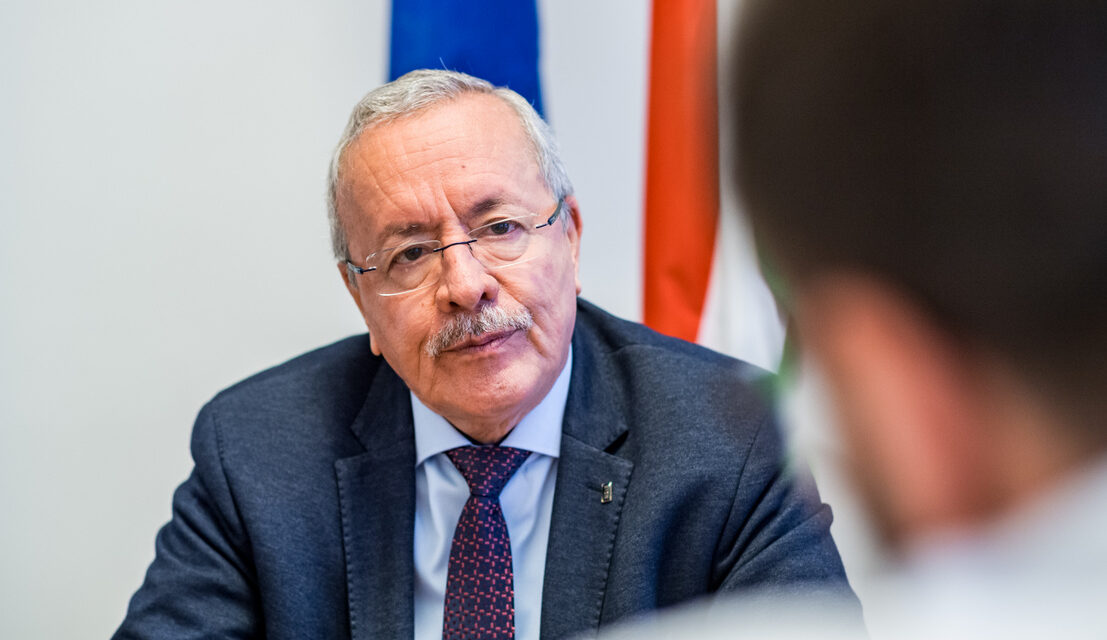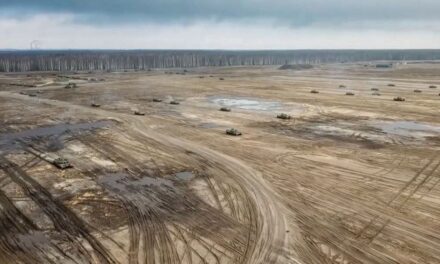The last time, perhaps during the Rákosi era, was that the prosecutor proposed a prison sentence, and then the judge thought about it and said: oh, no, I'd rather sentence him to death. Interview.
"Since 2015, a lot of garbage and dirt have been thrown at the Hungarians and the government, and now it has become clear how many of our police officers were injured, how heroically they defended themselves, for many years, holding back the pressure of hundreds of thousands of people. Now, with the new migration pact, these people are actually being shot in the back, attacked in the back," the prime minister's chief adviser on internal security told Index , who analyzed the current migration situation in detail in reference to the latest judgment of the European Court of Justice.
The routes have been completely transformed
How should migration challenges be imagined in Europe these days, how do the current data compare to 2015 and previous years?
Illegal migration shows a high level of activity and even growth on all main routes to Europe, that is, on the Spanish, Italian and Balkan routes. Unfortunately, the number of people lost at sea has increased, human smuggling activity has become more intense, and the former filters, which can be seen in the Sahel region, for example, have been arrested there before and prevented them from reaching Tunisia through the Sahara. , to Morocco, Libya, and from there to the Italian coast. At the same time, the three-row and six-meter high Spanish fence could also be stormed by illegal immigrants. Now, partly due to the reduction of the deterrent power of the Sahel region, the sea route has become dominant.
However, there was a diversion on the Balkan route, as a result of the strict Serbian police measures introduced in the last quarter of last year and the activity of the Hungarian border fence and border guard forces, the people smugglers left. There were mainly Afghans here, but they moved to the Bosnian-Croatian border, and then a shift began in terms of arriving illegal immigrants as well.
Now the main route is Albania, Montenegro, Bosnia and Herzegovina, Croatia, Slovenia and Italy.
The latter is trying to make efforts to coordinate Italian, Slovenian and Croatian border guarding efforts. As a result of this, a significant decrease occurred on the southern border of Hungary. As of Friday, we have caught a total of 1,502 border violators this year, last year we experienced many times that number, a total of 173,000, but we also caught 58,000 in the same period last year. So there is a significant reduction. In terms of human traffickers, we caught 32 people this year, compared to more than 400 at this time last year. It is also clear from the numbers that diversion has become a feature.
Is there a similar trend in Romania?
Migrants arrive legally in Romania and partly in Serbia by plane, and from there they try to enter the countries of the European Union with a work permit and illegally - primarily by hiding in vehicles. In the last quarter of last year, serious measures had to be taken in very close cooperation with the Serbian police forces because an untenable border security situation developed on the Hungarian border. Armed clashes were commonplace. The criminal gangs divided the territory among themselves because they also asked for money for someone to pass through their territory. Damage to our border lock and attacks on police forces guarding the border were regular, and seven policemen were injured. They threw stones, sticks, huge pieces of wood, slingshotted iron balls, and after a while they even fired firearms into the air, and once they even shot at our patrols.
However, as a result of the aforementioned efforts, the Hungarian border guard is stable and fulfills its basic task, which we intended for it since 2015. Illegal immigration must be stopped at the border, and based on security considerations, it is most useful if the arrivals submit their asylum applications outside the borders of the European Union, and only those who have been granted refugee status by a state in its official procedure enter – then legally.
It is part of the overall context that Greece is showing intensive growth. Mainly on the islands, despite the fact that the Greeks built a huge and serious fence on the Turkish-Greek green border. Despite this, human trafficking is very common there. At the same time, this can also be said about Turkey, since they have built a very significant fence on the Syrian and Iranian borders, despite this, border violators and illegal immigrants arrive in large numbers on the European continent with the help of people smugglers.
As far as Hungary is concerned, it is therefore conceivable that an illegal immigrant arrives from an EU member state and is eventually stopped by one of the Hungarian authorities. Thus, the question arises, in such a case, what is the safest country to which it can be sent back?
This is a very remarkable point, because the key state of the Balkan route is Greece. Thus, the strange situation arises that in the case of Greece, we are talking about a state that is a member of the European Union and part of the Schengen agreement. At the same time, border violators who arrive there go on to other EU member states through non-EU member states. So North Macedonia, Montenegro and Bosnia-Herzegovina are defending themselves, even though the illegal immigrants are coming from an EU member state. This is an unsolved problem as of 2015. The politicians of the European Union thought that the solution was that there is a lot of pressure in Greece, meaning that those arriving there should be divided.
So it didn't even arise that the border should be guarded. The situation is similar for Romania, although it is not currently part of the Schengen area, so internal border control currently exists on the Hungarian-Romanian border. The border violators who come from Romania mostly try to enter Hungary by hiding in vehicles. The vast majority of those hiding in the truck are found, but at the same time, since there is joint control at these crossings with the Romanian authorities, the illegal accusers mostly remain in custody there, and they almost always fail the control.
Hungary received a huge fine
The European Court of Justice accuses Hungary of regularly ignoring EU asylum rules, and in their view, the government has committed an unprecedented violation. The European Court ordered Hungary to pay a fine of 200 million euros due to extremely serious violations of EU asylum legislation. How do you rate this?
First of all, I would like to emphasize that this is a matter of 2020, when the transit zone was liquidated under the pressure of the European Union. Because it was not possible to leave this only towards Serbia, that is, it was closed, so according to them we detained them, which is against the regulations. Although it was previously said that the costs could be shared with other member states, this did not happen, the Hungarian border fence and the entire system are not financed by the European Union. However, this is an external Schengen border, and we enforce all the provisions of the relevant convention. Those arrested do not reach the countries of the European Union through us.
That's when the infringement procedure started, which we didn't carry out, saying that this transit zone works perfectly, it's not a closed camp, there is a way to seek legal redress, immigrants can go to court and wait for the judge's verdict. Nevertheless, the solution did not win the favor of Brussels, and the European Commission turned to the court, according to the decision made in the infringement procedure, the illegal migrants should be allowed into Hungarian territory and there they should wait for their asylum application to be assessed.
At the same time, in Hungary we are well aware of what this means: they would come in, submit their asylum application, and then run away. If we were to accept this, then an important basic principle of our border control - that you cannot enter Hungary illegally or forcibly - would be violated, on the other hand, we previously stated that the refugee application must be submitted outside the Hungarian border. This ensures efficiency.
Why is this issue now back in the spotlight?
Before the elections, it was clear that the European Commission's proposal referred to the imposition of a daily fine of HUF six million. After that, the court's verdict was not announced until the elections, it was rightly assumed that such a punishment would cause outrage in Hungary, where a large proportion of the population opposes illegal immigration. Therefore, they were afraid that if the current decision was made public, they would activate another significant voting base among Fidesz voters. Therefore, the announcement of the verdict was scheduled for after the elections. Here, however, the European Commission's proposal was not taken into account, but a 70-fold increase was imposed: a one-time fine of 200 million euros and a daily fine of 1 million euros, which is unprecedented.
The last time, perhaps during the Rákosi era, was that the prosecutor proposed a prison sentence, and then the judge thought about it and said: oh, no, I'd rather sentence him to death.
It is quite clear that they want Hungary to change its policy as a result of this financial blackmail and to join the provisions of the migration pact. Let's assume the fantastic situation that someone on the other side shoots with a machine gun, then climbs over the fence, puts down the machine gun and says, excuse me, I want to apply for political refugee status, then we take him to the camp, feed him, drink him, take care of him, house him and then then we grant him political asylum.
This is the kind of demand that bears the traces of the Soros plan, which has been clearly visible since 2015. It is often said that the Soros plan is just talk, but unfortunately every line of it is realized in reality. For example, it includes the need to admit one million migrants every year. If we look at last year's data, one million people just arrived in the European Union. So this is being implemented consistently. The current court decision is also a consequence of this Soros plan.
Now please, let's put the Soros plan aside. As far as I know, there were other court rulings. One of the decisions stated that Hungary commits basic human rights violations in the camps.
We abolished these camps in 2020, so we can no longer commit any human rights violations there. Beyond the border, you can go to the Hungarian embassy in Belgrade and submit your asylum application there. The European Union wants to establish the camps now. Right now, their plan is to set up camps for many thousands of people next to the external border. There are currently no camps in Hungary, and we have no intention of creating such camps. We don't have camps on the other side of the border either, as I said. The Hungarian embassy in Belgrade is an excellent place to submit your asylum application.
A refugee is someone who is persecuted in a country because of their religious, racial or political affiliation, and who is entitled to temporary protection in the nearest safe country during the period of persecution. At the same time, the non-refugee who comes here from the depths of Africa, say Uganda, is brought here for money with the help of criminal gangs. His identity is unknown and he is not cooperating with the authorities. He comes hoping for a better life, to be supported here, where there is a good life, because that is what he heard from his friends who are here.
Likewise, the right to rescue from the sea is an important principle. Everyone has the right that if they are in trouble at sea, the nearest ship will send the SOS signal and then they will save them. This is a very important principle. But if someone is rescued from the Mediterranean, he is not entitled to political asylum in Europe. The mistake. It is a basic human right to be prevented from drowning at sea. Human rights certainly do not extend to allowing those criminals who shoot, throw, and attack police officers in and keep them for the rest of their lives, just like in Germany.
And what happens to anyone who arrives in Hungary by any means? With those who somehow get across the Romanian or Croatian border.
If it is on the Romanian border, then there is an agreement, the captured border violators will be returned to the Romanian authorities. Anyone who comes from, say, Serbia and comes over the fence, is escorted back to the fence and then to the other side of the fence based on the law. From then on, he can go to Serbia to get Hungarian refugee status, or he can travel wherever he wants.
How many cross the Hungarian border?
Look at how many people get through Hungary, it would be good to know, but this is called latency. So, of course, whoever gets through us because, say, he hid so well in a truck, the sensor didn't detect his heartbeat and went through the country and then exited towards Austria, of course we don't know about that. Just like the Austrians don't know either, because very often they get on with them. The rate at which we arrest those arriving at, say, the Serbian border refers to, for example, the 1,502 people I mentioned, of which we prevented 1,140, so we prevented their passage there at the fence. And we escorted 583 back, so they got over the fence, and we intercepted them at a depth of, say, 100 meters, or 500 meters, and escorted them back to the other side of the fence.
We protect the Schengen area
These refugees do not really want to stay in Hungary. The question is often asked why we don't help them to continue to the West.
What do you think the Austrians or Slovaks would say about this? What would happen would be that they would close their border and command the army there, which the Austrians had already done before. And then in Hungary we would collect them in a bag, because they can't go any further, and they would be here. So there is no guarantee that if we continue to release them, others will accept them. But we have no such intention. We enforce the strict external border control system of the Schengen zone, and the fact is that border control must be abolished at the internal borders, and the external border must be guarded in such a way that we enforce the interests of those with an internal border in the interests of the border guard.
Viktor Orbán said on Kossuth Radio on Friday that "we have a dispute with Brussels, we don't think they have the right to tell us to live with migrants and immigrants. I'm wondering how to solve it so that it hurts them more than us". Accordingly, we do not intend to pay the penalty.
First they call us, then again after 45 days, and then after 15 days they send another reminder, and if we don't fulfill the payment obligation even after that, they want to deduct it from the EU funds at the very end.
So we really have no influence on this, if we don't pay, then that much less EU money will come to Hungary.
Yes, but we are talking about quite significant amounts of money, 200 million euros. Now the question is, what kind of money do we receive from the European Union?
In the previously mentioned radio interview, the Prime Minister said that "I obtained 12 billion of the 22 billion for Hungary in bloody handouts."
This also shows that this migration pact is financial blackmail. It is about either we pay, and then we will be in a difficult economic situation, and sooner or later they will achieve their goal, that is, if the economy collapses and the government fails. Or we don't pay, and then we are constantly punished, and as a result of all this, dissatisfaction among the population is growing. Since 2015, they have heaped a lot of rubbish and dirt on the Hungarians and the government, and now it has become clear how many of our police officers were injured, how heroically they defended themselves, for many years, holding back the pressure of hundreds of thousands of people.
Now, with these rules, with the new migration pact, these people are actually being shot in the back, attacked in the back.
They will take this money if we don't pay, but at the same time, we still have to consider what the government is going to do, and we have to analyze the judge's verdict to see exactly what we would refer to. On the other hand, it is necessary to examine what solutions are possible, which could potentially neutralize this provision during consultation with the Commission. One thing is for sure, abolishing the border guard and allowing the illegal entry of people brought here without permission, often violently by criminals, is out of the question.
Isn't Hungary geographically the point?
Please, let's cover the global and historical context as well. Migration and the movement of human groups have been unstoppable for thousands of years. Moreover, according to Huntington's theory, Hungary is located near the border of Western civilization. Do you think migration can be stopped at all?
Ethnic groups in Africa naturally move, in 15 years the population of Uganda or Nigeria increased by 70-80 million, the carrying capacity of the country cannot even serve the current population. People try to go elsewhere to avoid starvation, this is a natural process in Africa. The question is, how did this get diverted in the direction of Europe? So what happened in 2015? How did those who set out on their journey get the idea to come to Europe? If we compare the information we found with the migrants, we find the instructions given by the Soros organizations on who to call in which country and what kind of help you can expect. So there has been some organization, some management here since 2015, and it has been going on ever since, the activity of the Open Society Foundation.
The philosophy of an open society, the creation of mixed societies and the denial of the previous cultural past, church past, national past, and this is unacceptable for a Christian, conservative, sovereignist government.
Hungary is in a situation where, while there is primarily an illegal immigration movement on the Serbian and Romanian sections, at the same time refugees are also arriving from Ukraine, namely from the war. So not only do we provide help with the delivery of food and medicine, we take in wounded Ukrainian soldiers, but we also took in a large number of refugees.
I will tell you the data from Friday: the total number of people fleeing the war is 1 million 353 thousand 421 people who entered the Hungarian border. All of them had documents and were cooperative. They are usually young men fleeing the military, or families, old men fleeing the war. Hungary fulfilled its obligations in this direction to the maximum extent. They are fully treated as refugees, since they are fleeing a devastating war.
Isn't it due to Hungary's geographical situation that there will always be groups of people migrating here?
We believe that the most important task of the government in today's world is the protection of the Hungarian people, the protection of internal security, because this is the basis of economic development, social welfare and everything else. And this was confirmed by the majority of people in various elections. That is why the continuation of this policy is in Hungary's first priority interest.
Featured image: Tamás Kaszás / Index













